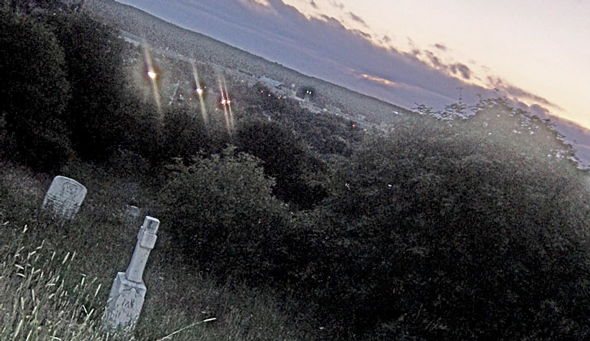A Dialogue on Love, Life and Death
 Cemetery, Emily Slofstra
Cemetery, Emily Slofstra
Ominous, relentless and permanent are probably the three words most apt in describing the term death. And, almost as if out of a storybook, it somehow communicated to me the value of life.
It is one of nature’s greatest lessons. We should not fear death, but respect it. It is a reminder that we should use our time wisely, whether we are spiritual or not. We are afraid of death because we enjoy living.
Entertaining death has led me to concentrate on other phenomenological aspects of life. Questions like the meaning of life and the purpose of love hold far-reaching consequences death will never share. Yet today, we know more about death than either of these two, unequivocally more important, realities of our existence. We are intimately acquainted with death. Could that be because we have not heeded nature’s lesson?
What makes us detach the intransigence of death from having any real meaning? We seem to kill, sometimes without question, and it hardly occurs to us that a life, once silenced, can never flourish again. I feel something has led us astray; away from the appreciation of life that we really need to uphold as the rulers of this world. Although death has extreme consequences, it would appear that we have yet to fully understand them, or that our means of interpreting death have become too archaic for this modern world.
But what about interpreting life? I would like to propose another curious fact of nature, a second lesson, put in place to protect the first. It involves the claim that the meaning of life and the purpose of love are somehow inexorably linked.
I do not expect to convince all of you, this is just something interesting to think about.
The question that troubles us all, perhaps the greatest question, or for some, the only question that must be answered before our lives come to their inevitable ends, concerns why we are here. What is the meaning of life?
I think it will please you to know that I have come to a conclusion that, at least for me, is so utterly convincing and self-satisfying that the age-old question has ceased to be puzzling.
At the biological level, the sole purpose of everything living is the proliferation of itself—reproduction. This is a fact that cannot be refuted, as replication is also the fundamental function of DNA, the most rudimentary biological element of any species. When it comes to the reproduction of our own species, the preferred relationship between sexes, although this is not always the case, is one of monogamy. The fact that we are a monogamous species mostly by choice allows for love between partners to develop as one of humankind’s most admirable qualities.
At the spiritual level, life can be looked at most simplistically by concluding that it is merely a means to an end. I think we can all agree that living a life with love at its core is not so bad, and love just so happens to go hand and hand with our biological desire to reproduce. Love is not needed to create life, but who can protest against its benefits towards cultivation. Alas, the purpose of love?
The first lesson is a real one. It is infallible. Time, when not well spent, is more often than not, met with disappointment. We have all experienced this feeling. When looking at a life, we reflect; was it time well spent?
The second lesson is meant to protect the first in only one way. Love, as the meaning of life, only works because you want it to. If you think for a moment, that it does not mesh with you and your beliefs, you simply do not have the right mindset. If you want it to work, then it will, because all of the memories of your life will be filled with love, and when you look back you will understand that it was time well spent.
A secret no longer, it can be said then that the meaning of life is to fall in love and replace ourselves on this planet with beautiful miniatures of ourselves. However, we all know the world we live in often does not leave room for such idealistic agendas. I like to think, then, that the meaning of life can be what we want it to be, if not the pursuit of happiness in whichever manner we see fit.
I do not believe in today’s Gods, however, I am spiritual, and I am philosophical. I believe in the power, and in the ingenuity of the human spirit, and that love and life are evermore the answers to the world’s problems than death.